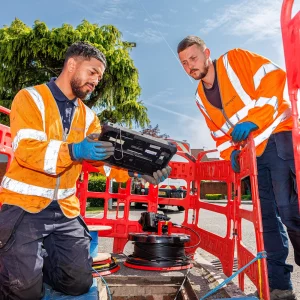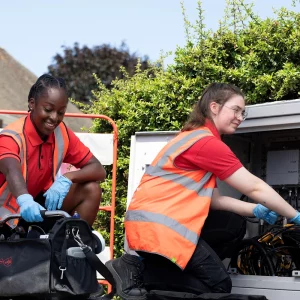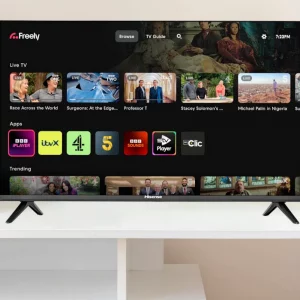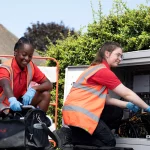Sponsored Links
UK Consumers Lose Faith in Mobile Broadband Services
Posted: 09th Oct, 2009 By: MarkJ
Charles Dunstone, CEO of The Carphone Warehouse ( TalkTalk ), claims that sales of Mobile Broadband services have peaked and many customers are now believed to be heading back to the sanctuary of fixed land-line broadband connections instead. Growing dissatisfaction with poor speeds and limited coverage take most of the blame, although that's hardly surprising when most operators raise expectations to almost ridiculous levels.
 Frustratingly Dunstone does not reveal any statistics to support his claim and every other piece of research we've seen has appeared to communicate the opposite conclusion. Similarly the idea that Mobile Broadand is somehow suddenly becoming a "supplementary rather than a substitutional" service is not new; it's always been positioned that way.
Frustratingly Dunstone does not reveal any statistics to support his claim and every other piece of research we've seen has appeared to communicate the opposite conclusion. Similarly the idea that Mobile Broadand is somehow suddenly becoming a "supplementary rather than a substitutional" service is not new; it's always been positioned that way.
Dunstone also touches on the growing popularity of free Wi-Fi, although while this might be true in major cities like London, it does not hold much water once you start venturing outside of those locations. The only free Wi-Fi outside of city centres that we see usually comes from unsecured personal networks.
Still, much as stated in our opening paragraph and other recent articles (check this out), the current generation of Mobile Broadband technology remains deeply flawed. This situation is continually frustrated by mobile operators that fail to give consumers a realistic expectation of true service quality, which can be far slower than the advertised rate; not to mention unreliable too.
The next generation of Mobile Broadband technology – known as Long Term Evolution ( LTE ) – will put right many of this generations mistakes. Sadly you will have to wait another year or two before LTE finds its feet in the UK and until then the situation is unlikely to see a drastic improvement.
Charles Dunstone, CPW CEO, told The Guardian:
"We get a sense that the mobile broadband thing has peaked. We are seeing some of those people begin to realise that the bandwidth you get on mobile is so much less than you get on a fixed line. Mobile broadband is increasingly a supplementary rather than a substitutional thing, and an increasing proportion of Carphone sales are of pre-pay dongles.
I carry one around with me and am also surprised now how much free Wi-Fi is available: on the train, a lot of hotels have it, bars etc. I'm using Wi-Fi more when I am out and about than mobile broadband."
"We get a sense that the mobile broadband thing has peaked. We are seeing some of those people begin to realise that the bandwidth you get on mobile is so much less than you get on a fixed line. Mobile broadband is increasingly a supplementary rather than a substitutional thing, and an increasing proportion of Carphone sales are of pre-pay dongles.
I carry one around with me and am also surprised now how much free Wi-Fi is available: on the train, a lot of hotels have it, bars etc. I'm using Wi-Fi more when I am out and about than mobile broadband."
 Frustratingly Dunstone does not reveal any statistics to support his claim and every other piece of research we've seen has appeared to communicate the opposite conclusion. Similarly the idea that Mobile Broadand is somehow suddenly becoming a "supplementary rather than a substitutional" service is not new; it's always been positioned that way.
Frustratingly Dunstone does not reveal any statistics to support his claim and every other piece of research we've seen has appeared to communicate the opposite conclusion. Similarly the idea that Mobile Broadand is somehow suddenly becoming a "supplementary rather than a substitutional" service is not new; it's always been positioned that way.Dunstone also touches on the growing popularity of free Wi-Fi, although while this might be true in major cities like London, it does not hold much water once you start venturing outside of those locations. The only free Wi-Fi outside of city centres that we see usually comes from unsecured personal networks.
Still, much as stated in our opening paragraph and other recent articles (check this out), the current generation of Mobile Broadband technology remains deeply flawed. This situation is continually frustrated by mobile operators that fail to give consumers a realistic expectation of true service quality, which can be far slower than the advertised rate; not to mention unreliable too.
The next generation of Mobile Broadband technology – known as Long Term Evolution ( LTE ) – will put right many of this generations mistakes. Sadly you will have to wait another year or two before LTE finds its feet in the UK and until then the situation is unlikely to see a drastic improvement.
Search ISP News
Search ISP Listings
Search ISP Reviews
Latest UK ISP News








Cheap BIG ISPs for 100Mbps+
150,000+ Customers | View More ISPs
Cheapest ISPs for 100Mbps+
Modest Availability | View More ISPs
Latest UK ISP News
Helpful ISP Guides and Tips
Sponsored Links
The Top 15 Category Tags
- FTTP (6779)
- BT (3877)
- Politics (3065)
- Business (2759)
- Openreach (2657)
- Building Digital UK (2506)
- Mobile Broadband (2466)
- FTTC (2139)
- Statistics (2121)
- 4G (2085)
- Virgin Media (2016)
- Ofcom Regulation (1776)
- 5G (1723)
- Fibre Optic (1600)
- Wireless Internet (1592)
Sponsored
Copyright © 1999 to Present - ISPreview.co.uk - All Rights Reserved - Terms , Privacy and Cookie Policy , Links , Website Rules
































